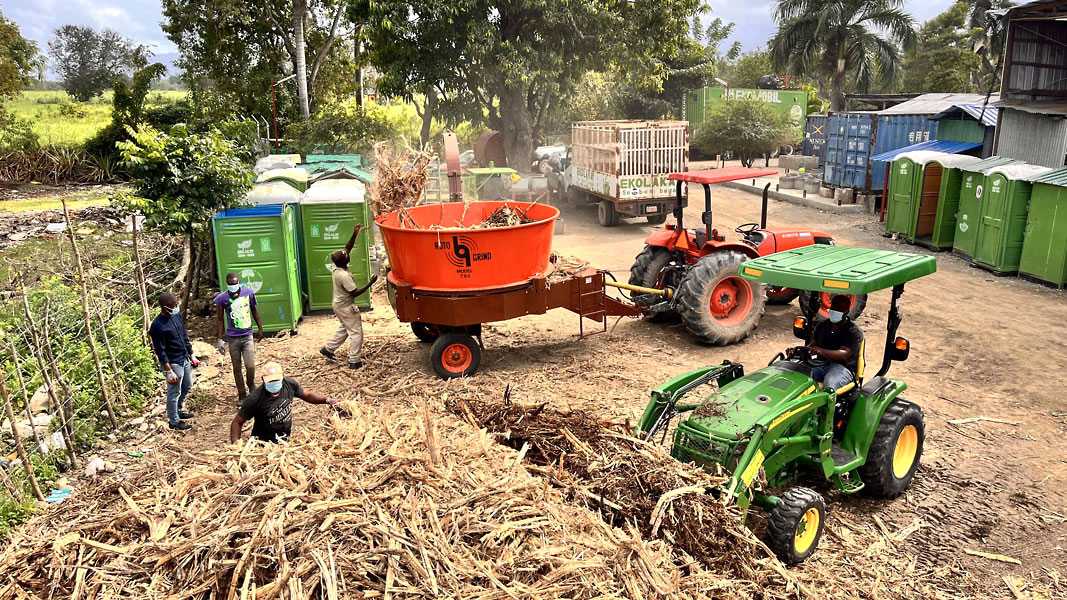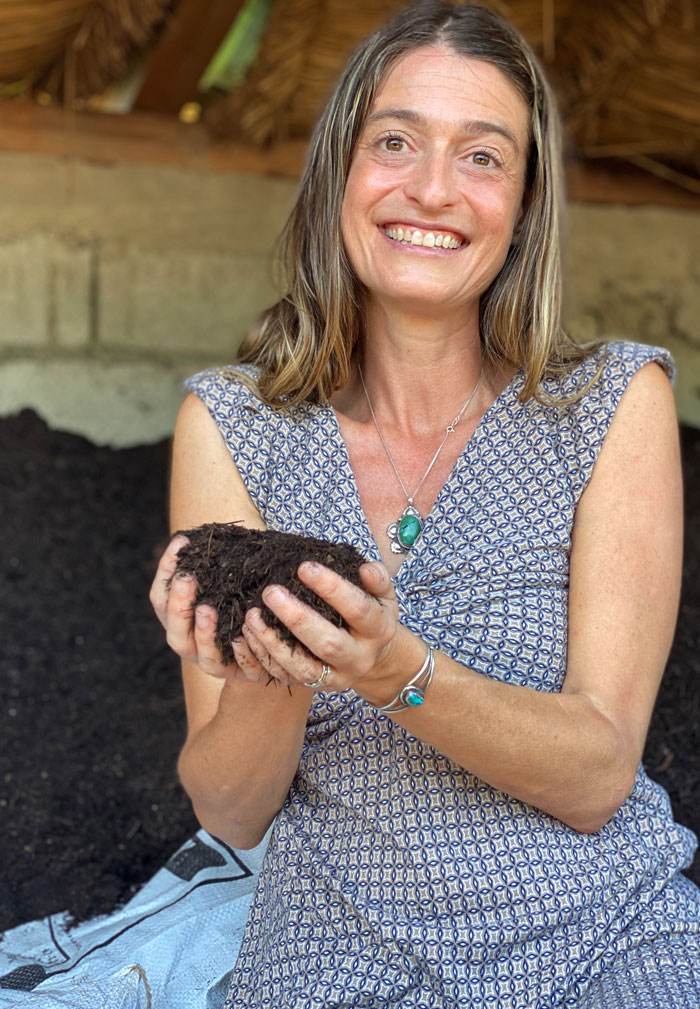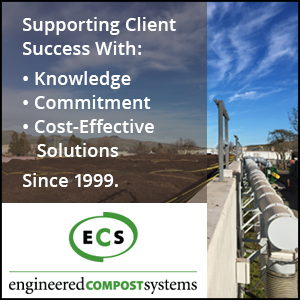Top: SOIL recently acquired a grinder to size reduce the bagasse that is used as bulking agent for composting. Photos courtesy SOIL
Rich Flammer
“Our success has come through building relationships,” emphasizes Dr. Sasha Kramer, co-founder and Executive Director of SOIL (Sustainable Organic Integrated Livelihoods), a nonprofit organization working in Haiti to “design, test, and implement sustainable and equitable solutions” to the Caribbean nation’s sanitation crisis. Since the organization began in 2006, SOIL has navigated through catastrophic earthquakes, hurricanes, floods, political and public health crises, societal violence, and economic instability. “We work in an extremely fragile environment and never know what issue is going to come up next,” she adds. Yet through the power of relationships established with diligent staff, flexible funders, a committed board, customers, the government, consultants, local businesses and similarly minded nonprofits, the organization has grown, won awards, and expanded its reach to provide some 19,230 people with its in-home sanitation service called EkoLakay (offsetting ~1 metric ton of CO2eq per household per year), and 50,000 residents access to SOIL’s public toilets annually.
All of those “human resources,” some 1,100 tons collected each year, are transformed into compost and sold in both bulk and bags to farmers, businesses and other organizations sorely in need of healthier, more productive soil. In a previous BioCycle article on SOIL, it was noted that Haiti doesn’t simply have poor soil, but rather due to deforestation and erosion, a relatively sparse base of any earth at all. The 250 tons of compost currently produced is a modest, but welcomed resource for reestablishing the island’s soil mass, as well as its fertility.
SOIL’s composting system “turns a public health and environmental contamination threat into a climate-positive solution,” while providing tens of thousands of Haitians with the privacy, dignity and convenience of access to toilets. Some 3.5 million Haitians living in the country’s cities still do not have access to in-home sanitation. They rely on using a neighbor’s toilet, one at work, the rare public toilet available, or going in a bag or out in the open. Those who can afford it pay for pit latrine or septic tank installation, informal “emptiers” and one of the few formal septic tank emptying companies available. In the north of the country, where SOIL provides its services, pit latrine and septic tank material is untreated and dumped in open spaces.
SOIL expands access in three ways. Its EkoLakay service offers households container-based sanitation (CBS) that includes a urine diversion toilet and weekly collection service. Public toilets at the busy central market of Cap-Haitien are available to thousands of market vendors and visitors. And SOIL also offers a portable toilet rental service — at affordable rates —for private events, construction sites, and public festivals, among others. SOIL currently operates the only treatment site for this material in northern Haiti.
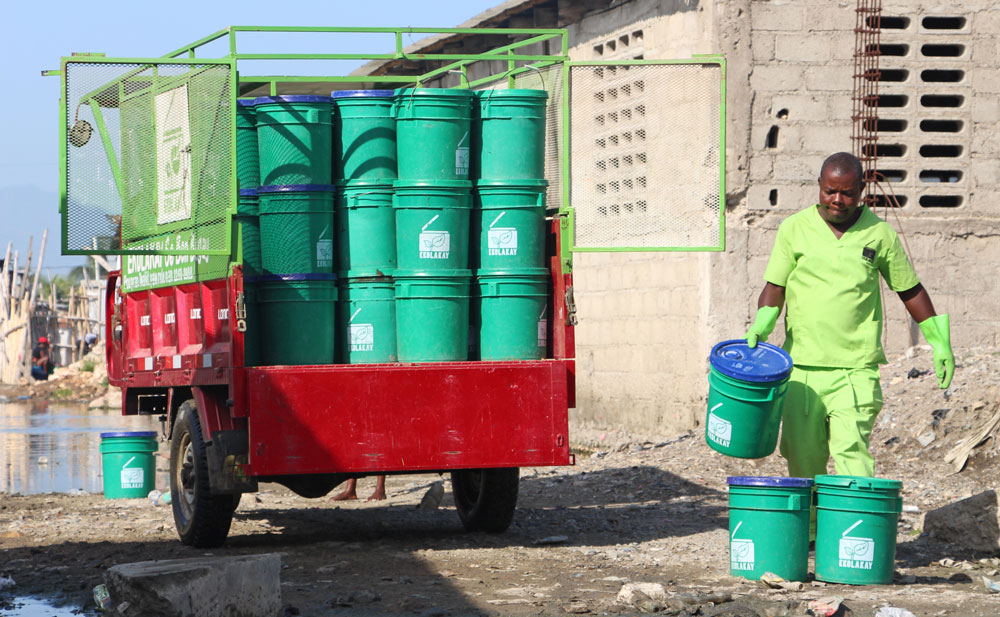
The “human resources” are collected by SOIL staff and transported to the composting site. Buckets and lids are power washed and submerged in a chlorine solution, then air dried in the sun.
Composting Operations
Material collected from all three avenues of service is delivered to the nonprofit’s composting facility for treatment and conversion into compost. SOIL’s composting operation, located about seven miles southeast of the primary service areas in Cap-Haitien, is approximately 3.3 acres on government-owned land leased to the organization on 10-year renewable contracts. The nonprofit recently negotiated leasing three more parcels of land, totaling 7.5 acres, to the north. The current site is close to a property slated for development of a solid waste facility/landfill, and SOIL is in discussions with the development team of that facility to become an outlet for capturing discarded organics for composting. Haiti has never had a sanitary, lined landfill, and this would be the first.
Once delivered to the composting facility, strict sanitation and treatment protocols are followed to ensure pathogen destruction. Treatment methods are labor intensive, but continually being refined to improve efficiency. Collection buckets and lids are power washed, submerged in a chlorine solution, then set out in the sun to dry. Collection vehicles are also put through a disinfection step with a >/+ 0.2% chlorine solution applied.
An open windrow process has replaced the bin system previously used. Collected material is bulked with bagasse, a sugar cane processing residual, at a ratio of 4:1 by volume (bagasse:human resources). Windrows are covered by a geofabric called MacTex, procured from a company in Santo Domingo, Dominican Republic. Historically, windrows have been turned by SOIL staff by hand with shovels, but a recent purchase of a Frontier tow-behind Mighty Mike windrow turner will replace that arduous task. SOIL has also recently purchased a tractor to pull the unit, another tractor with a bucket, and a Roto Grind 760 tub grinder for reducing the particle size of bagasse. Bagasse is not only used for bulking agent, but also provided to households as a cover and flushing agent for their toilet.
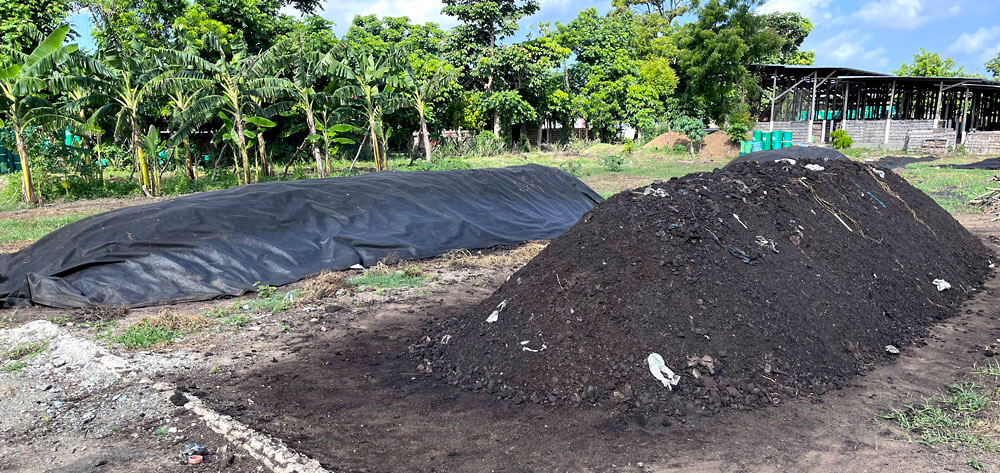
Collected material is bulked with bagasse, a sugar cane processing residual, at a ratio of 4:1 by volume (bagasse:human resources). Windrows are covered by a geofabric to optimize composting.
Sourcing reliable equipment at a reasonable cost is difficult for small to mid-scale operators. The turner and grinder are exceptionally well-designed, well-made units, each at a cost of around $30,000. It was important to procure low maintenance machinery, as service, repair and parts are extremely limited on the island. Both of these units fit the bill. Jesse Burrows, a technician with Roto Grind, travelled to Haiti to help maximize the grinder’s efficiency, resulting in nearly tripling the unit’s throughput.
A multitude of challenges exist moving equipment of this size from the continental U.S. to the island, including exorbitant tariffs, long delays at customs, and issues inherent in moving large machinery across land and sea to a relatively small port in the middle of the Caribbean. After purchase, both units took about six months to get to the SOIL composting facility.
With the addition of the new equipment, windrow construction, aeration, moisture conditioning, and monitoring protocols are currently being revised, but because raw human excreta is being handled and processed, SOIL has strict regimes for pathogen control. Trained by the World Health Organization (WHO), the organization has developed a model program that complies with and exceeds WHO standards.
The composting facility has two designated zones, “red” for active material unloading and processing, and “green” for material that has gone through the treatment phase and pathogen reduction. Temperature is monitored for eight consecutive days in three different locations and at two different depths. Per WHO guidelines the substrate must reach a minimum of 122°F for seven consecutive days. After an active phase of approximately two and a half months, the material is cured for four to five months (this time period may be revised given use of the new equipment and mechanized aeration), then tested for E. Coli. Periodic testing for helminth is also conducted. Per WHO guidelines, substrate passes and is deemed “negative” if the E. Coli concentration is ≤1MPN/100mL. While SOIL does send samples to labs outside of Haiti, they have found testing in-house is advantageous. Its lab, while not certified, can conduct regular pathogen analyses, and basic agricultural suitability analysis for each batch, including pH and electrical conductivity. The lab is also used for research, such as a recent Black Soldier Fly pilot designed to explore diversified resource recovery methods and revenue streams.
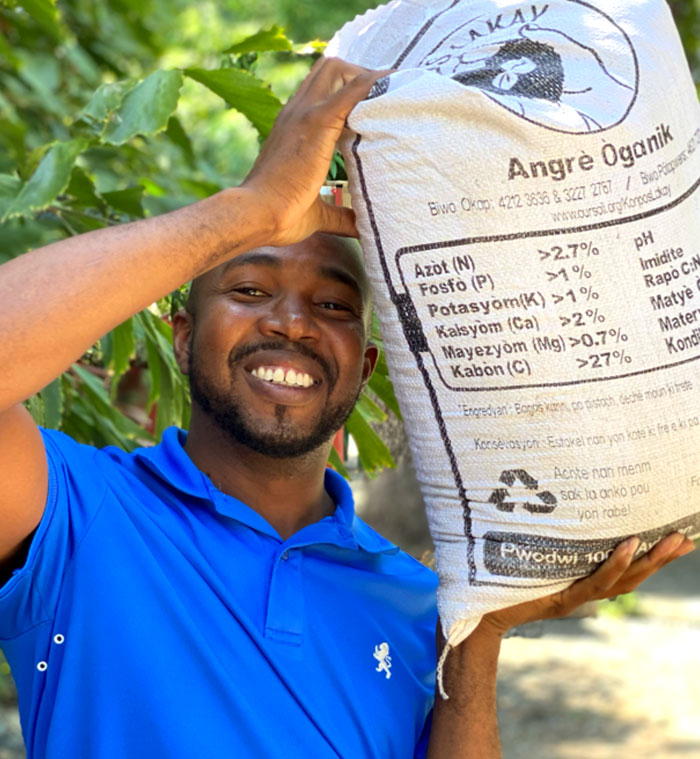
“Every bag of compost we produce represents improved Haitian lives, a healthier environment, less disease, community bonding, and employment opportunities,” says Sasha Kramer.
SOIL’s operations and reach continue to progress, despite ongoing issues with operating in a nation frequently in political turmoil and battered by natural disasters. “One of our biggest challenges is actually how fast we’ve been able to grow, and trouble with financing keeping up with it,” explains Nick Preneta, Chief Operating Officer of SOIL. “We’re at a pivotal moment with the government and development banks for funding to continue building our collection service and composting program to our goal of sanitation access for ~10% of the population of Cap Haitien. We’re also at a critical, but very positive tipping point where we’re seeing behavior change in the neighborhoods.” Some 83% of SOIL’s clients have never had a private toilet before, but most aspire to have one like their wealthier neighbors. For those unsure, early adopters in the communities SOIL serves have helped build acceptance by sharing their experience. The organization also has also found having the toilets they distribute in their own office as well as homes of staff members is important, promoting something that they themselves use.
“Every bag of compost we produce represents improved Haitian lives, a healthier environment, less disease, community bonding, and employment opportunities,” concludes Kramer. “True to our mission, we can’t imagine better outcomes than that.”
Rich Flammer is principal of Hidden Resources, a composting and zero waste consulting firm in San Diego, California. He is a long-time Contributing Writer to BioCycle.


